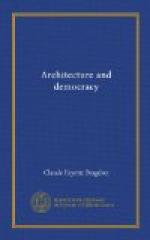To the architect falls the task, in the new dispensation, of providing the appropriate material environment for its new life. If he holds the old ideas and cherishes the old convictions current before the war he can do nothing but reproduce their forms and fashions; for architecture, in the last analysis, is only the handwriting of consciousness on space, and materialism has written there already all that it has to tell of its failure to satisfy the mind and heart of man. However beautiful old forms may seem to him they will declare their inadequacy to generations free of that mist of familiarity which now makes life obscure. If, on the other hand, submitting himself to the inspiration of the demos he experiences a change of consciousness, he will become truly and newly creative.
His problem, in other words, is not to interpret democracy in terms of existing idioms, be they classic or romantic, but to experience democracy in his heart and let it create and determine its new forms through him. It is not for him to impose, it is for him to be imposed upon.
“The passive Master lent his hand
To the vast soul that o’er
him planned”
says Emerson in The Problem, a poem, which seems particularly addressed to architects, and which every one of them would do well to learn by heart.
If he is at a loss to know where to go and what to do in order to be played upon by these great forces let him direct his attention to the army and the army camps. Here the spirit of democracy is already incarnate. These soldiers, violently shaken free from their environment, stripped of all but the elemental necessities of life; facing a sinister destiny beyond a human-shark-infested ocean, are today the fortunate of earth by reason of their realization of brotherhood, not as a beautiful theory, but as a blessed fact of experience. They will come back with ideas that they cannot utter, with memories that they cannot describe; they will have dreamed dreams and seen visions, and their hearts will stir to potencies for which materialism has not even a name.
The future of the country will be in their young hands. Will they re-create, from its ruins, the faithless and loveless feudalism from which the war set them free? No, they will seek only for self-expression, the expression of that aroused and indwelling spirit which shall create the new, the true democracy. And because it is a spiritual thing it will come clothed in beauty; that is, it will find its supreme expression through the forms of art. The architect who assists in the emprise of weaving this garment will be supremely blessed, but only he who has kept the vigil with prayer and fasting will be supremely qualified.
III
AFTER THE WAR
“When the old world is sterile
And the ages are effete,
He will from wrecks and sediment
The fairer world complete.”




